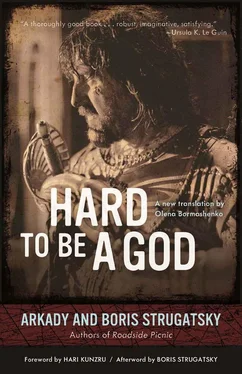“The worst is over,” he said. “And when this is all done, we’ll leave this place.”
She quieted down, clinging to him. Muga, nodding his head, stood nearby, looking indifferent, holding the master’s pants with little gold bells at the ready.
“But first, there’s a lot to do here,” continued Rumata. “There were many killed last night. I need to find out who survived and who was killed. And I need to help save the ones they are planning to kill.”
“And who will help you?”
“Happy is the man who thinks of others. Besides, you and I are being helped by powerful men.”
“I can’t think of others,” she said. “You came back barely alive. I can tell you were beaten. And they killed Uno outright. What were your powerful men doing? Why didn’t they stop the killing? I don’t believe you. I don’t believe you.”
She tried to get away, but he held her tight. “What can we do?” he asked. “This time they were a little late. But they are now watching us and protecting us again. Why don’t you believe me today? You’ve always believed me before. You’ve seen it yourself: I came back barely alive, and look at me now!”
“I don’t want to look,” she said, hiding her face. “I don’t want to cry again.”
“There! Just a few scratches! It’s nothing. The worst is over. At least for you and me. But there are very good, wonderful people for whom this horror hasn’t ended yet. And I have to save them.”
Kira took a deep breath, kissed Rumata’s neck, and gently freed herself. “Come back tonight,” she said. “Please come back?”
“Of course!” he said fervently. “I’ll come back earlier, probably not alone. Expect me for dinner.”
She stepped aside, sat down in a chair, and putting her hands in her lap, watched him get dressed. Rumata, mumbling Russian words, pulled on the pants with the little bells (Muga immediately crouched down in front of him and started to fasten the numerous buckles and buttons), put the now-blessed chain mail over a clean undershirt, and finally said in despair, “Little one, please understand, I have to go—what can I do? I have no choice!”
Kira suddenly said pensively, “Sometimes I can’t understand why you don’t hit me.”
Rumata froze in the middle of buttoning up a shirt with a frilly ruff. “What do you mean, why I don’t hit you?” he asked, bewildered. “How could I hit you?”
“You’re not just a good, kind man,” she continued, not listening. “You’re also a very strange man. You’re like an archangel. When you’re with me, I become brave. Right now I’m brave. Someday, I’ll definitely have to ask you about one thing. Will you—not right now, but later, when it’s all done—tell me about yourself?”
Rumata was silent for a long time. Muga handed him an orange waistcoat with striped red bows. Rumata pulled it on with disgust and tightened his belt. “Yes,” he finally said. “Someday I’ll tell you everything, little one.”
“I’ll wait,” she said seriously. “And now go, and pay no attention to me.”
Rumata came close to her, kissed her lips with his swollen lips, then took an iron bracelet off his arm and gave it to her. “Put it on your left arm,” he said. “No one else should come to the house today, but if they do—show them this.”
She was watching him go, and he knew exactly what she was thinking. She was thinking, I don’t know if you’re the devil or the son of God or a man from the fabulous countries overseas, but if you don’t come back, I’ll die. And because she was silent, he was infinitely grateful to her, because leaving was incredibly difficult—like diving headfirst from a sunny emerald shore into a rancid pool.
Rumata took the back roads to the office of the Bishop of Arkanar. He crept through the residents’ small yards, getting tangled in old clothes hung out to dry; climbed through holes in fences, leaving splendid bows and bits of precious Soanian lace on rusty nails; and hastily crawled between potato patches. But he still couldn’t evade the watchful eye of the black army. When he climbed out into the narrow, crooked alley that led to the dump, he bumped into two gloomy, tipsy monks.
Rumata tried to go around them—the monks drew their swords and blocked the way. Rumata grabbed the hilts of his swords—the monks gave a three-fingered whistle, calling for help. Rumata started to retreat toward the hole he had just climbed out of, but a nimble little man with an insignificant face suddenly jumped out toward him into the alley. Jostling Rumata with his shoulder, he ran up to the monks and said something to them, after which the monks picked their cassocks up over their long, purple-clad legs and trotted away, disappearing behind the houses. The little man shuffled after them without turning around.
Got it, thought Rumata. A spy-bodyguard. And he isn’t even bothering to hide much. The Bishop of Arkanar is being prudent. I wonder what he’s most worried about—what I’ll do, or what they’ll do to me? Following the spy with his eyes, he headed toward the dump. The dump led to the back of the offices of the former Ministry of the Defense of the Crown and was, he hoped, not patrolled.
The alley was empty, but he could already hear shutters softly creaking, an infant crying, and people whispering cautiously. A gaunt, thin face, black from baked-in soot, warily poked out from behind a half-rotted fence. Fearful, hollow eyes stared at Rumata.
“I beg your pardon, noble don, and beg your pardon again. Won’t the noble don tell me what’s happening in the city? I’m the blacksmith Kikus, nicknamed Limpy, and I need to go to the smithy, but I’m scared.”
“Don’t go,” Rumata advised. “The monks aren’t kidding around. There’s no more king. The man in charge now is Don Reba, the Bishop of the Holy Order. So sit tight.”
The blacksmith hastily nodded after each word, and his eyes filled with anguish and despair. “The Order, huh,” he muttered. “Oh, cholera… Beg your pardon, noble don. So it’s now the Order. Are they grays or what?”
“Nah,” Rumata said, eyeing him with curiosity. “The grays might be finished. These are monks.”
“Oh, wow!” said the blacksmith. “So they got the grays too. That’s some Order! The grays are finished—that’s good, of course. But what about us, noble don, what does Your Lordship think? Will we adapt, eh? Under the Order, eh?”
“Why not?” said Rumata. “The Order needs to eat and drink too. You’ll adapt.”
The blacksmith perked up. “That’s what I figure—we’ll adapt. The way I figure it, the most important thing’s not to bother anyone, then no one will bother you, eh?”
Rumata shook his head. “Oh, no,” he said. “The ones who don’t bother anyone get slaughtered first.”
“That’s true,” the blacksmith sighed. “But what can you do? All alone in the world, with eight brats clutching my pants. Oh, Holy Mother, I hope they at least slaughtered my master! He was a gray officer. What does Your Lordship think? Could they have slaughtered him, noble don? I owed him five gold pieces.”
“I don’t know,” Rumata said. “They might have slaughtered him. Here’s something else for you to ponder, blacksmith. You’re all alone in the world, but there are ten thousand of you in the city.”
“So?” said the blacksmith.
“Think about it,” Rumata said irritably, and kept walking.
The hell he’ll think of anything. It’s too early for him to think. And it seems so simple: ten thousand hammerers like that, in a rage, could crush anyone to a pulp. Except rage is what they don’t have yet. Only fear. Everyone for himself, only God for all.
Читать дальше












